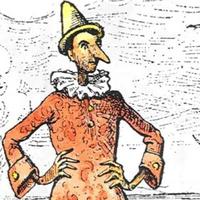Capitolo 25
Pinocchio promette alla Fata di essere buono e di studiare, perché è stufo di fare il burattino e vuol diventare un bravo ragazzo.
In sulle prime la buona donnina cominciò col dire che lei non era la piccola Fata dai capelli turchini: ma poi, vedendosi oramai scoperta e non volendo mandare più a lungo la commedia, fini col farsi riconoscere, e disse a Pinocchio:
— Birba d'un burattino!
Come mai ti sei accorto che era io?
— Gli è il gran bene che vi voglio quello che me l'ha detto.
— Ti ricordi?
Mi lasciasti bambina e ora mi ritrovi donna; tanto donna, che potrei quasi farti da mamma.
— L'ho caro dimolto, perché così, invece di sorellina, vi chiamerò la mia mamma.
Gli è tanto tempo che mi struggo di avere una mamma come tutti gli altri ragazzi!… Ma come avete fatto a crescere così presto?
— È un segreto.
— Insegnatemelo: vorrei crescere un poco anch'io.
Non lo vedete? Sono sempre rimasto alto come un soldo di cacio.
— Ma tu non puoi crescere, — replicò la Fata.
— Perché?
— Perché i burattini non crescono mai.
Nascono burattini, vivono burattini e muoiono burattini.
— Oh!
sono stufo di far sempre il burattino! — gridò Pinocchio, dandosi uno scappellotto. — Sarebbe ora che diventassi anch'io un uomo come tutti gli altri.
— E lo diventerai, se saprai meritartelo…
— Davvero?
E che posso fare per meritarmelo?
— Una cosa facilissima: avvezzarti a essere un ragazzino perbene.
— O che forse non sono?
— Tutt'altro!
I ragazzi perbene sono ubbidienti, e tu invece…
— E io non ubbidisco mai.
— I ragazzi perbene prendono amore allo studio e al lavoro, e tu…
— E io, invece, faccio il bighellone e il vagabondo tutto l'anno.
— I ragazzi perbene dicono sempre la verità…
— E io sempre le bugie.
— I ragazzi perbene vanno volentieri alla scuola…
— E a me la scuola mi fa venire i dolori di corpo.
Ma da oggi in poi voglio mutar vita.
— Me lo prometti?
— Lo prometto.
Voglio diventare un ragazzino perbene e voglio essere la consolazione del mio babbo… Dove sarà il mio povero babbo a quest'ora?
— Non lo so.
— Avrò mai la fortuna di poterlo rivedere e abbracciare?
— Credo di si: anzi ne sono sicura.
A questa risposta fu tale e tanta la contentezza di Pinocchio, che prese le mani alla Fata e cominciò a baciargliele con tanta foga, che pareva quasi fuori di sé.
Poi, alzando il viso e guardandola amorosamente, le domandò:
— Dimmi, mammina: dunque non è vero che tu sia morta?
— Par di no, — rispose sorridendo la Fata.
— Se tu sapessi, che dolore e che serratura alla gola che provai, quando lessi qui giace …
— Lo so: ed è per questo che ti ho perdonato.
La sincerità del tuo dolore mi fece conoscere che tu avevi il cuore buono: e dai ragazzi buoni di cuore, anche se sono un po' monelli e avvezzati male, c'è sempre da sperar qualcosa: ossia, c'è sempre da sperare che rientrino sulla vera strada. Ecco perché son venuta a cercarti fin qui. Io sarò la tua mamma…
— Oh!
che bella cosa! — gridò Pinocchio saltando dall'allegrezza.
— Tu mi ubbidirai e farai sempre quello che ti dirò io.
— Volentieri, volentieri, volentieri!
— Fino da domani, — soggiunse la Fata, — tu comincerai coll'andare a scuola.
Pinocchio diventò subito un po' meno allegro. — Poi sceglierai a tuo piacere un'arte o un mestiere…
Pinocchio diventò serio.
— Che cosa brontoli fra i denti?
— domandò la Fata con accento risentito.
— Dicevo… — mugolò il burattino a mezza voce, — che oramai per andare a scuola mi pare un po' tardi… — Nossignore.
Tieni a mente che per istruirsi e per imparare non è mai tardi.
— Ma io non voglio fare né arti né mestieri…
— Perché?
— Perché a lavorare mi par fatica.
— Ragazzo mio, — disse la Fata, — quelli che dicono così, finiscono quasi sempre o in carcere o all'ospedale.
L'uomo, per tua regola, nasca ricco o povero, è obbligato in questo mondo a far qualcosa, a occuparsi, a lavorare. Guai a lasciarsi prendere dall'ozio! L'ozio è una bruttissima malattia, e bisogna guarirla subito, fin da ragazzi: se no, quando siamo grandi, non si guarisce più. Queste parole toccarono l'animo di Pinocchio, il quale rialzando vivacemente la testa disse alla Fata:
— Io studierò, io lavorerò, io farò tutto quello che mi dirai, perché, insomma, la vita del burattino mi è venuta a noia, e voglio diventare un ragazzo a tutti i costi.
Me l'hai promesso, non è vero?
— Te l'ho promesso, e ora dipende da te.

